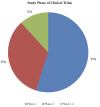Targeting the medulloblastoma: a molecular-based approach
- PMID: 32608377
- PMCID: PMC7975825
- DOI: 10.23750/abm.v91i7-S.9958
Targeting the medulloblastoma: a molecular-based approach
Abstract
Background: The lack of success of standard therapies for medulloblastoma has highlighted the need to plan a new therapeutic approach. The purpose of this article is to provide an overview of the novel treatment strategies based on the molecular characterization and risk categories of the medulloblastoma, also focusing on up-to-date relevant clinical trials and the challenges in translating tailored approaches into clinical practice.
Methods: An online search of the literature was carried out on the PubMed/MEDLINE and ClinicalTrials.gov websites about molecular classification of medulloblastomas, ongoing clinical trials and new treatment strategies. Only articles in the English language and published in the last five years were selected. The research was refined based on the best match and relevance.
Results: A total 58 articles and 51 clinical trials were analyzed. Trials were of phase I, II, and I/II in 55%, 33% and 12% of the cases, respectively. Target and adoptive immunotherapies were the treatment strategies for newly diagnosed and recurrent medulloblastoma in 71% and 29% of the cases, respectively.
Conclusion: Efforts are focused on the fine-tuning of target therapies and immunotherapies, including agents directed to specific pathways, engineered T-cells and oncoviruses. The blood-brain barrier, chemoresistance, the tumor microenvironment and cancer stem cells are the main translational challenges to be overcome in order to optimize medulloblastoma treatment, reduce the long-term morbidity and increase the overall survival.
Conflict of interest statement
Each author declares that he or she has no commercial associations (e.g. consultancies, stock ownership, equity interest, patent/licensing arrangement etc.) that might pose a conflict of interest in connection with the submitted article
Figures
Similar articles
-
Molecular stratifications, biomarker candidates and new therapeutic options in current medulloblastoma treatment approaches.Cancer Metastasis Rev. 2020 Mar;39(1):211-233. doi: 10.1007/s10555-020-09854-1. Cancer Metastasis Rev. 2020. PMID: 31970590 Free PMC article. Review.
-
Conventional Therapies Deplete Brain-Infiltrating Adaptive Immune Cells in a Mouse Model of Group 3 Medulloblastoma Implicating Myeloid Cells as Favorable Immunotherapy Targets.Front Immunol. 2022 Mar 3;13:837013. doi: 10.3389/fimmu.2022.837013. eCollection 2022. Front Immunol. 2022. PMID: 35309309 Free PMC article.
-
Medulloblasoma: challenges for effective immunotherapy.J Neurooncol. 2012 May;108(1):1-10. doi: 10.1007/s11060-011-0776-1. Epub 2011 Dec 16. J Neurooncol. 2012. PMID: 22173741 Review.
-
Coming in from the cold: overcoming the hostile immune microenvironment of medulloblastoma.Genes Dev. 2022 May 1;36(9-10):514-532. doi: 10.1101/gad.349538.122. Genes Dev. 2022. PMID: 35680424 Free PMC article. Review.
-
Adoptive immunotherapies in neuro-oncology: classification, recent advances, and translational challenges.Acta Biomed. 2020 Jun 30;91(7-S):18-31. doi: 10.23750/abm.v91i7-S.9952. Acta Biomed. 2020. PMID: 32608373 Free PMC article.
Cited by
-
Long-Term Outcomes of Radiation Therapy for Pediatric Brain Tumors: A Single-Center Study.Cureus. 2025 Mar 27;17(3):e81282. doi: 10.7759/cureus.81282. eCollection 2025 Mar. Cureus. 2025. PMID: 40291172 Free PMC article.
-
Overcoming Treatment Resistance in Medulloblastoma: Underlying Mechanisms and Potential Strategies.Cancers (Basel). 2024 Jun 18;16(12):2249. doi: 10.3390/cancers16122249. Cancers (Basel). 2024. PMID: 38927954 Free PMC article. Review.
-
Pediatric traumatic brain injury: a new relation between outcome and neutrophil-to-lymphocite ratio.Acta Biomed. 2022 Mar 21;92(S4):e2021417. doi: 10.23750/abm.v92iS4.12666. Acta Biomed. 2022. PMID: 35441607 Free PMC article.
-
Immune microenvironment of medulloblastoma: The association between its molecular subgroups and potential targeted immunotherapeutic receptors.World J Clin Oncol. 2023 Mar 24;14(3):117-130. doi: 10.5306/wjco.v14.i3.117. World J Clin Oncol. 2023. PMID: 37009528 Free PMC article. Review.
-
Drugging Hijacked Kinase Pathways in Pediatric Oncology: Opportunities and Current Scenario.Pharmaceutics. 2023 Feb 16;15(2):664. doi: 10.3390/pharmaceutics15020664. Pharmaceutics. 2023. PMID: 36839989 Free PMC article. Review.
References
-
- Smoll NR, Drummond KJ. The incidence of medulloblastomas and primitive neurectodermal tumours in adults and children. J Clin Neurosci. 2012;19(11):1541–1544. https://doi.org/10.1016/j.jocn.2012.04.009 . - PubMed
-
- Ramaswamy V, Remke M, Bouffet E, et al. Risk stratification of childhood medulloblastoma in the molecular era: the current consensus. Acta Neuropathol. 2016;131(6):821–831. https://doi.org/10.1007/s00401-016-1569-6 . - PMC - PubMed
-
- Pui CH, Gajjar AJ, Kane JR, Qaddoumi IA, Pappo AS. Challenging issues in pediatric oncology. Nat Rev Clin Oncol. 2011;8(9):540–549. https://doi.org/10.1038/nrclinonc.2011.95 . - PMC - PubMed
-
- Salloum R, Chen Y, Yasui Y, et al. Late Morbidity and Mortality Among Medulloblastoma Survivors Diagnosed Across Three Decades: A Report From the Childhood Cancer Survivor Study. J Clin Oncol. 2019;37(9):731–740. https://doi.org/10.1200/JCO.18.00969 . - PMC - PubMed
-
- Ning MS, Perkins SM, Dewees T, Shinohara ET. Evidence of high mortality in long term survivors of childhood medulloblastoma. J Neurooncol. 2015;122(2):321–327. https://doi.org/10.1007/s11060-014-1712-y . - PubMed
Publication types
MeSH terms
LinkOut - more resources
Full Text Sources
Medical



